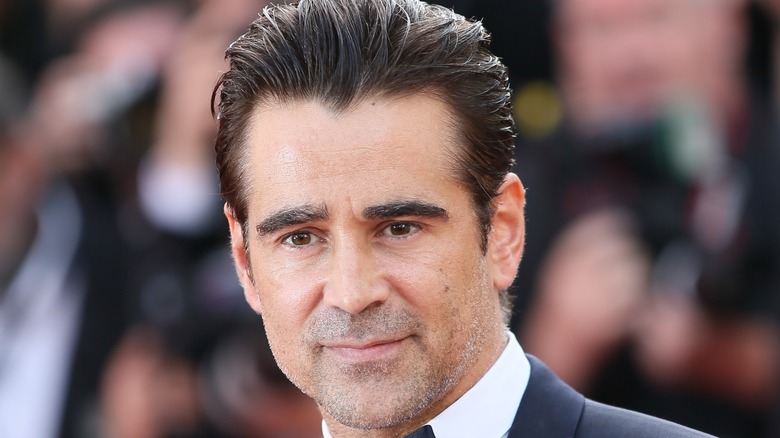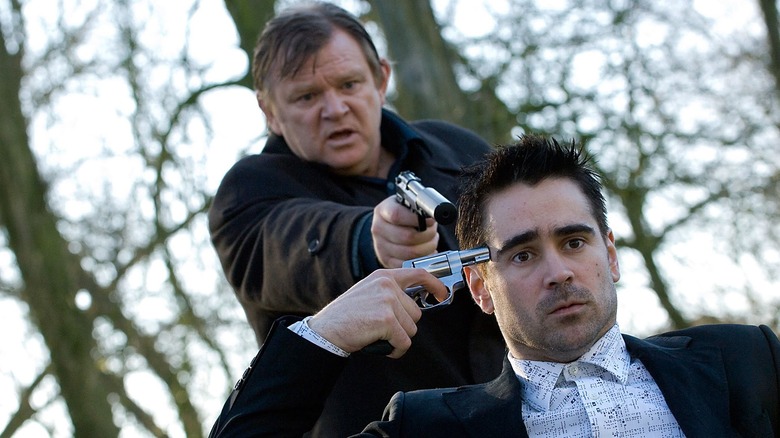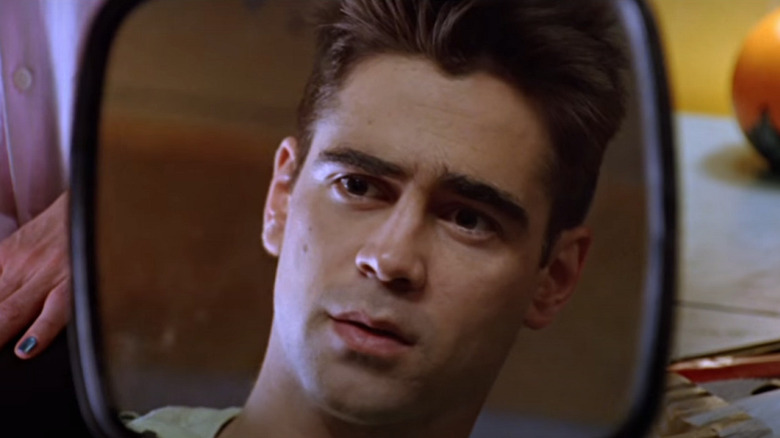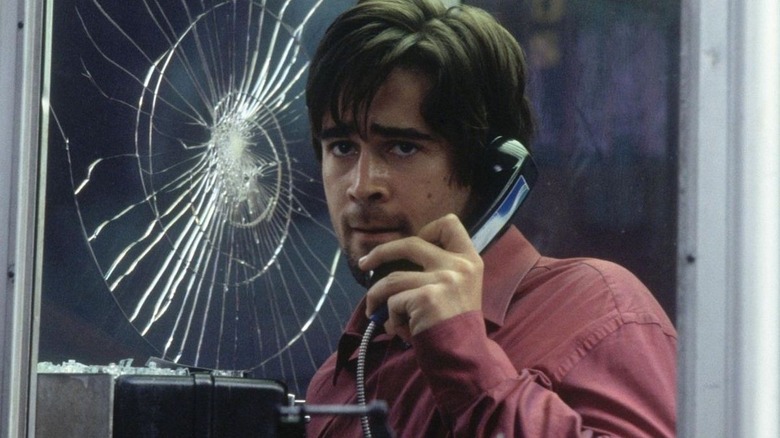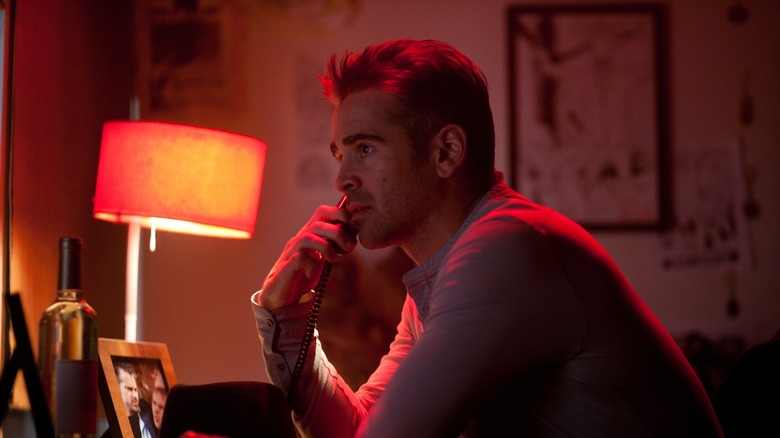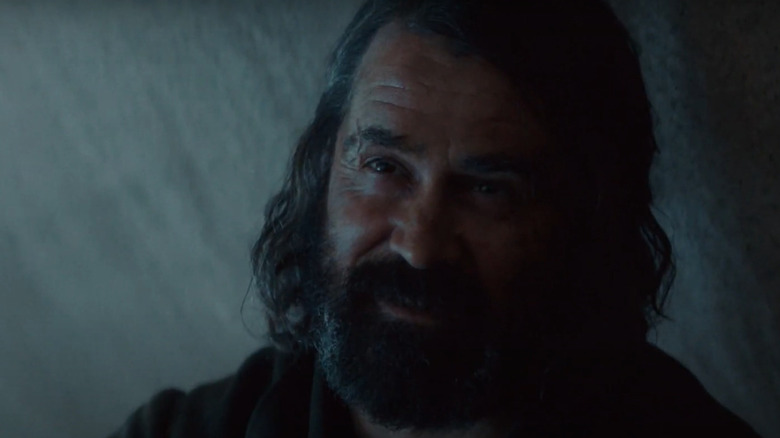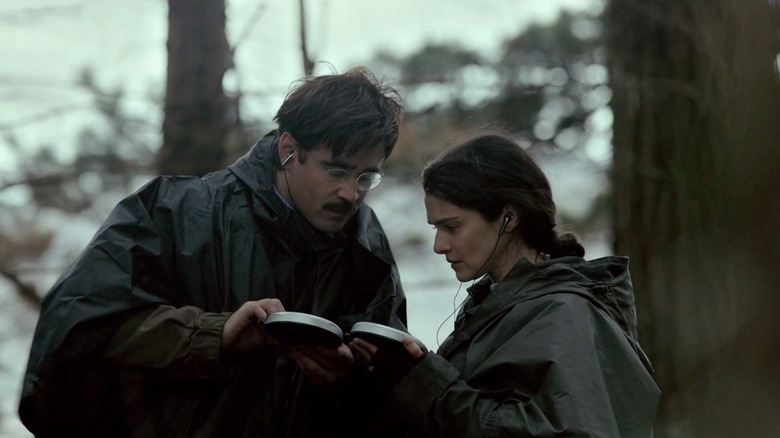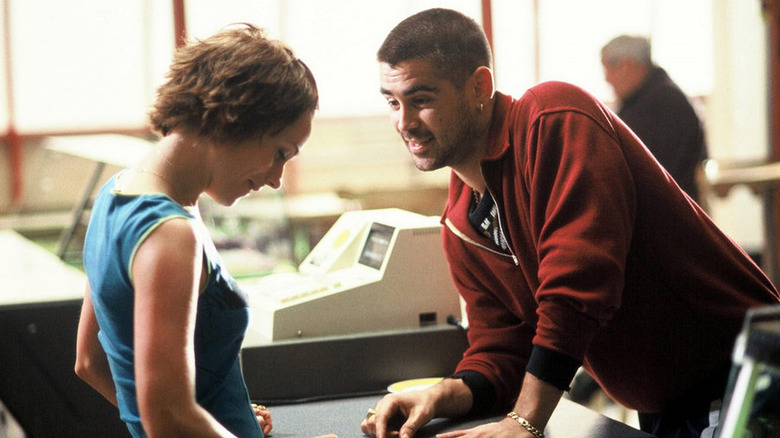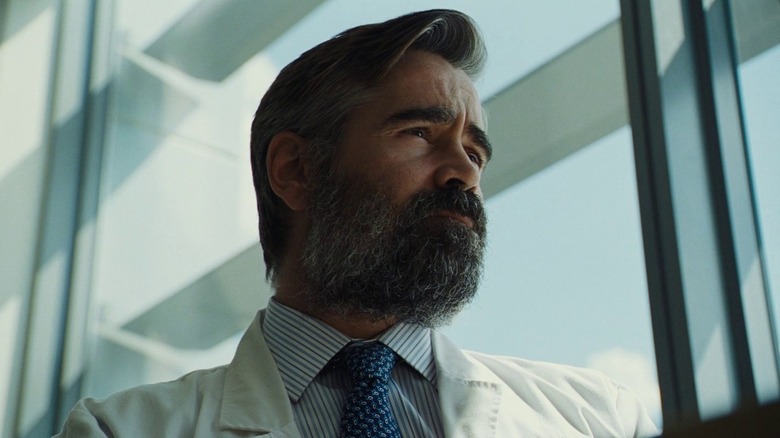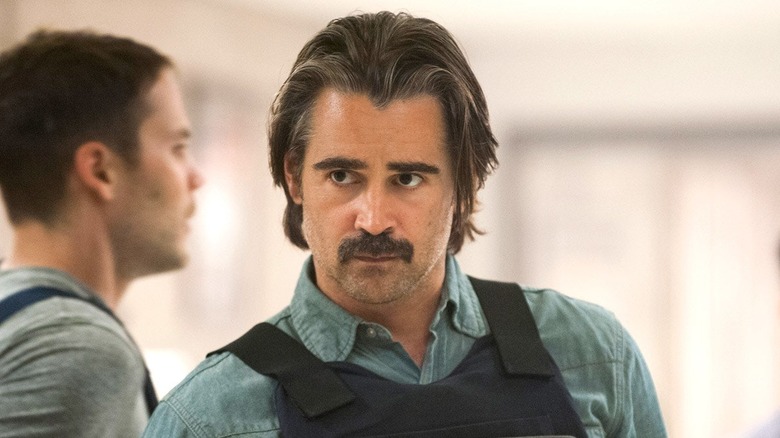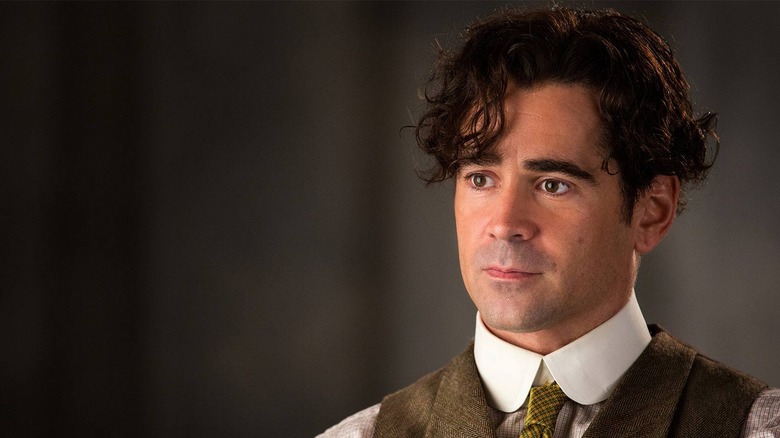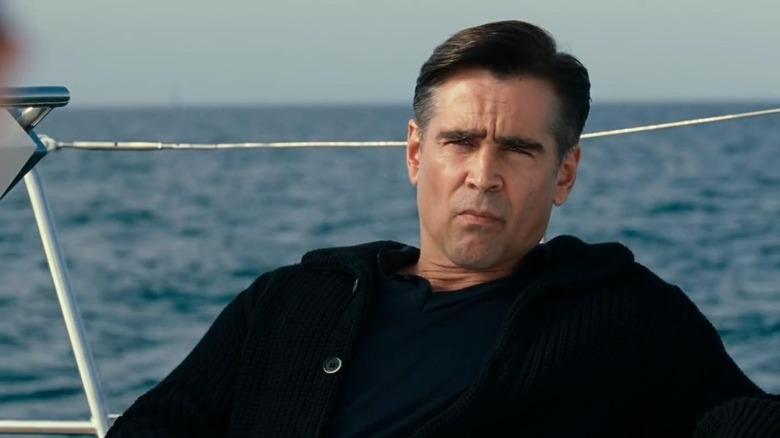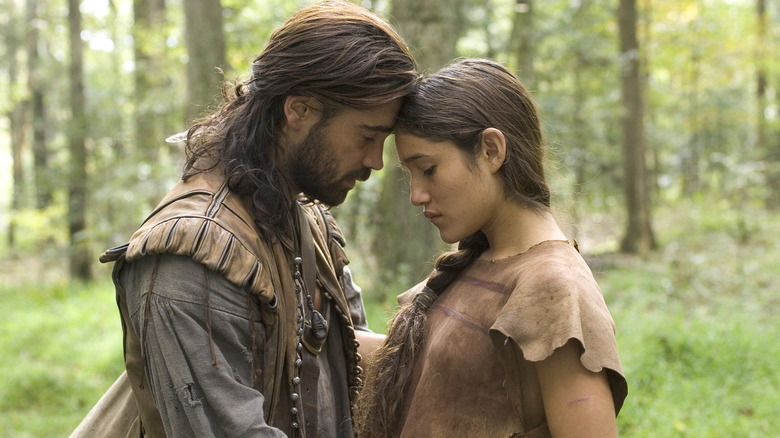Colin Farrell's Best Movie And TV Roles To Date
When he first burst onto the scene as an actor of note, Colin Farrell was a heartthrob, one of many that have dominated Hollywood in its 100+ years. But in a filmography that now spans over two decades, Farrell has become more than just another pretty face on the silver screen. While he still appears in mainstream fare like "Dumbo" and "The Batman," he's also taken to headlining challenging and unique indie projects that have stunned critics and earned him heaps of accolades. In pursuing such projects, Farrell has managed to work with an eclectic group of filmmakers that range from Martin McDonagh to Joel Schumacher to Yorgos Lanthimos. Partnering with such vivid filmmakers has taken Farrell's career to exciting new heights that keep expanding his talents as an artist.
This achievement is reflected in the most acclaimed roles of Farrell's career, which include a pair of television performances, serving as a testament to his versatility. Though the character details and highly-praised qualities of these individual performances vary considerably, the best Colin Farrell roles to date exemplify the bold creative instincts that have transformed him from a traditional leading man into an incredibly exciting actor.
In Bruges
By the year 2008, Colin Farrell's career wasn't spiraling, but it did need a boost. Luckily for Farrell, "In Bruges" arrived in 2008 to give a massive jolt of life to the actor's career. Farrell's first collaboration with director Martin McDonagh, "In Bruges," isn't a mainstream-friendly film, but that's what makes it pivotal for Farrell. Rather than being just a typical film a Hollywood heartthrob would headline, "In Bruges" is dangerous, offbeat, and critically acclaimed.
Farrell got some of the best reviews of his career for his work in "In Bruges," and it's not hard to see why. Portraying a hitman who needs to lay low after a mission gone awry, Farrell constantly makes it apparent his character is someone the viewer should find abrasive and unlikeable. But there are also flashes of heart and vulnerability here that Farrell handles very well. With a thoughtful performance like this one, Colin Farrell ensured his leading man career wasn't vanishing anytime soon.
A Home at the End of the World
The indie film "A Home at the End of the World" landed in movie theaters in 2005 and proved to be a divisive feature. Some feel the project is an effectively wistful look at would-be revolutionaries grappling with the harshness of reality from the late 1960s to the early 1980s, while others find that the movie covers a wide stretch of time but offers little substance. One thing that unites most reviews of "A Home at the End of the World," though, is praise for the cast, particularly Colin Farrell in the most prominent role.
David Rooney of Variety, for example, heaped praise onto Farrell for his work (though he did offer criticism for some wigs the actor had to wear), with particularly positive notices given for the "softness and vulnerability" Farrell lends his performance. Similar qualities were noted even in negative reviews of "A Home at the End of the World." Even in a more disposable drama, Farrell still offers a powerful resonance that people can't stop talking about.
Phone Booth
This 2002 Joel Schumacher directorial effort isn't just a movie starring Colin Farrell: He is the entire movie. With the focus zeroed in on Farrell's protagonist dealing with a taunting and violent voice on a payphone, "Phone Booth" relies on Farrell to carry the proceedings. It's a tantalizing prospect for any actor, but also a daunting one that leaves little to no margin for error. The complexities of the role are further compounded by the fact that Farrell has to start the movie as supremely unlikeable, a tough figure for audiences to follow in such intimate confines for 90 minutes.
Thankfully, Farrell is more than up to the task. He revels in the sleazeball nature of the role, but never lapses into caricature. Best of all, he avoids becoming over-the-top in his acting style to compensate for the restrained scope of "Phone Booth." Farrell's wits as a performer are on display in this unorthodox endeavor, as evidenced by reviews from critics like Joe Morgenstern of The Wall Street Journal. In breaking down the elements that make "Phone Booth" such a compelling drama, Morgenstern singled out the "brilliance" of Farrell's work on-screen as critical to making this such a captivating feature. With affectionate praise like this, it's apparent that, when it comes to "Phone Booth," Colin Farrell rises to a daunting acting challenge instead of crumbling in front of it.
Seven Psychopaths
"Seven Psychopaths" gave Colin Farrell a chance to reunite with Martin McDonagh after their work together on "In Bruges." However, this production also offered a key challenge, as Farrell would be playing the most subdued personality in a film full of oversized criminal weirdos. Sam Rockwell and Christopher Walken get the big flashy roles, while Farrell has a thankless straight man role.
While Farrell does provide a more grounded anchor in a movie about dog-napping gone awry, he by no means vanishes in "Seven Psychopaths." Farrell exudes a realistic sense of weariness that underscores the tangible emotional stakes of this stylized Hollywood satire. This is especially apparent in the final scene of "Seven Psychopaths" where Farrell uses his voice and minimal body language to suggest that his character has resigned himself to a gruesome fate. It's a melancholy note that Farrell plays beautifully.
Moments like this also make for a great contrast with the more heightened performances that dominate the rest of the production. This sentiment was reflected in many reviews for "Seven Psychopaths," including Donald Clarke's write-up for The Irish Times, which observed how Farrell's work on-screen proved that his gifts are best suited for unorthodox indies rather than mainstream blockbusters.
The North Water
After his early work in the late 1990s on the TV show "Ballykissangel," Colin Farrell has largely eschewed television in favor of film work. However, the surging presence of prestige television in the 2010s has made it more attractive than ever for big-name performers to engage in small-screen fare. Thus, Farrell returned to headlining TV programming in 2015 with "True Detective" and explored this domain further with the miniseries "The North Water," a 2021 project hailing from "Lean on Pete" director Andrew Haigh. Farrell wasn't the only notable actor involved in the project, as Jack O'Connell and Stephen Graham were also part of the main cast.
Hayley Campbell of BBC lauded Farrell for being "unrecognizable" in his work on "The North Water," which this writer saw as being a critical reason why the show was such an immersive experience. Kylie Northover of The Age, meanwhile, echoed the sentiments of Farrell looking radically different (the actor put on a large amount of weight for this part) while praising the performer for lending a convincing air to his role "even when mostly grunting or smirking." Farrell's widely-lauded performance in "The North Water" made it apparent that he wasn't sacrificing any of his talents by returning to television.
The Lobster
Love is such a tricky thing to navigate, even without the looming threat of getting turned into a lobster hovering over one's head. Such is the scenario Colin Farrell's protagonist finds himself in during "The Lobster," which sees director Yorgos Lanthimos explore the pitfalls of dating through heightened dark comedy. Farrell's performance conveys an appropriate level of realism that accentuates the inherent awkwardness of being forced to find a romantic partner. Plus, he had great comedic chemistry with Rachel Weisz, as Eileen G'Sell of Salon observed, noting that Farrell's believable rapport with his co-star made their eventual romance "tender" and even "sexy." Giving this duo such a tangible connection ensured that "The Lobster" would have discernible human emotions in its intentionally subdued and dry atmosphere.
Even when he isn't palling around with Weisz, Farrell excels in "The Lobster," particularly when it comes to his keen wit, which perfectly suits Lanthimos' singular creative spirit. Farrell captures the highs and lows of romance (and everything in between) with subtle skill. His richly-layered lead performance is one of the best parts of the outstanding "The Lobster."
Intermission
Before he directed the Best Picture nominee "Brooklyn," John Crowley helmed the 2003 movie "Intermission." Considering this production hails from Ireland, it's no surprise that one of the country's biggest 21st century finds, Colin Farrell, managed to headline the production alongside fellow Irish silver screen figures Colm Meaney and Cillian Murphy. Though not a massive box office smash, "Intermission" did score positive reviews, with Farrell's central performance getting especially good notices.
Roger Ebert, for instance, commended Farrell's work in "Intermission" for being solid and blending well into an ensemble cast. Meanwhile, Elvis Mitchell of The New York Times singled out Farrell's performance in the opening scene of "Intermission," which oozes with confidence, for signaling the tone of the ensuing film. Ruthe Stein of The San Francisco Chronicle echoed these positive notes by observing how impressively he conveys a "menacing" aura. She also praised his decision to utilize his natural Irish accent, something he largely eschews in his Hollywood roles.
An earlier entry in Farrell's lengthy filmography, "Intermission" still stands out as eternally relevant to Farrell as a performer. The film is a showcase of some of his best traits, especially his deft work in ensemble casts and his ability to flourish in small-scale indie fare.
The Killing of a Sacred Deer
Colin Farrell returned to the uniquely weird world of Yorgos Lanthimos with "The Killing of a Sacred Deer," a brutally dark comedy that's often more disturbing than humorous. Lanthimos' films have a unique cadence that can be tough for certain actors to work with. Farrell, on the other hand, having already headlined one of his directorial efforts, has no trouble getting on the filmmaker's distinct wavelength once again.
Throughout his career, Colin Farrell has worked best in offbeat indie movie roles that allow him to portray deeply flawed human beings. His talent gets put to great use here, with Farrell fully committing to all the unhinged developments "The Killing of a Sacred Deer" throws at him, even as he shouts to Nicole Kidman about pubes and teeth. Even better, Farrell, having done so many straightforward leading man roles in the past, establishes a sense of normalcy at the start of the film, which is ultimately subverted. There are countless memorable details like that in Farrell's performance. His fidelity to those finer aspects makes him a perfect fit for a project like "The Killing of a Sacred Deer."
True Detective
There was no way Season 2 of "True Detective" wasn't going to come off as something of a disappointment, given Season 1's massive acclaim. Like clockwork, the sophomore season of "True Detective" proved to be a divisive affair that alienated many audience members. However, the majority of the performances did obtain praise, with lead actor Colin Farrell being one of those artists who scored positive marks for his work.
David Sims of The Atlantic, for example, praised Farrell's work on the show for authentically tackling a tormented character. Sims also observed that Farrell delivers committed work even as this season of "True Detective" threatens to lapse into caricature. Meanwhile, Willa Paskin of Slate declared Farrell to be the unsung hero thanks to his ability to carve out tangible humanity in a story that often seems divorced from reality. "True Detective" ended up experiencing a major Season 2 slump, but at least Farrell gives another memorable performance.
Saving Mr. Banks
Given that they play P.L. Travers and Walt Disney, respectively, it's understandable that most of the attention in "Saving Mr. Banks" goes to Emma Thompson and Tom Hanks. However, that doesn't mean there aren't other notable performers nestled within the ensemble cast. Case in point, Colin Farrell portrays Travers Robert Groff, Travers' father, during an assortment of flashback scenes. The role calls for Farrell to play Groff as someone a young Travers could believably look up to, while also depicting the character's troubled side when his alcoholism becomes more apparent.
This complicated role doesn't provide an enormous amount of screentime for Farrell, but he makes the most out of any moment he's on-screen. As a result, Farrell scored widespread praise for his work in "Saving Mr. Banks" — Leslie Felperin of The Hollywood Reporter went so far as to name this performance as his best in years. Meanwhile, Peter Travers of Rolling Stone declared Farrell to be "outstanding" in his work as Groff and emblematic of the high-quality performances that abound in "Saving Mr. Banks." Hanks and Thompson may have the most notable roles in "Saving Mr. Banks," but clearly, Farrell is no slouch in this Disney biopic either.
Widows
Steve McQueen's 2018 movie "Widows" is a compelling drama that feels like the love-child of Michael Mann and Robert Altman with its propulsive thrills and sprawling ensemble cast. Part of that expansive collection of characters is politician Jack Mulligan, played by Colin Farrell. His character serves as a fascinating reflection of how even powerful political figures who publicly stand for helping marginalized communities can end up merely serving their own self-interests. This is made particularly apparent during a scene where Mulligan wheels out mothers of color as props during a public speech, never lets them speak, and then, in an extended tracking shot, proceeds to disparage financially-challenged communities once he's inside his limo.
That tirade in his car is a particularly great sequence for Farrell as he's kept entirely off-screen. His vocals are all he needs to convey the character's personality and warped worldview so effectively. All the while, both in this sequence and throughout the whole film, Farrell keeps his performance firmly rooted in reality. His gift for realism is put to great use here to demonstrate that these kinds of troubling views can appear in anyone, not just broad caricatures that could only exist in the movies. The whole star-studded cast of "Widows" fires on all cylinders, and Farrell is no exception.
The New World
In Terrence Malick's work, actors are not the most important thing on-screen, if they're even in the frame to begin with. A scene's atmosphere, with radiant natural light, is often the focus of Malick's camera. This is just as true of his 2005 film "The New World," starring Colin Farrell, as it is of anything else in the director's career. In this project, Farrell plays Captain John Smith in a chronicling of events between indigenous Americans and European explorers at the dawn of the 17th century.
Sometimes, actors can get lost in the rhythm of Malick's unique style of filmmaking, as someone like Sean Penn can attest from his experiences on "The Tree of Life." But critics uniformly praised Farrell for delivering a performance that succeeds at both fitting into Malick's artistic space and being compelling in its own right. Ed Gonzales of Slant, for instance, commended Farrell's depiction of Smith dancing around a potential romance with an adolescent Pocahontas as "performance art." This unusual approach could only find a perfect home in a work by Malick.
